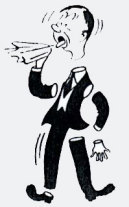Wednesday
Mar292006
Jackson Pollock coughing up fractals...
 Wednesday, March 29, 2006
Wednesday, March 29, 2006  After writing the previous post on the Jackson Pollock Fractal Forgery Fuss, I remembered that I had come across a poem about Pollock and fractals written by Theresa Hawkes a few years ago. The poem, titled The Artist Under Glass Talks Back, is a paean to artists , who are defined by their prescient ability to know the world ...
After writing the previous post on the Jackson Pollock Fractal Forgery Fuss, I remembered that I had come across a poem about Pollock and fractals written by Theresa Hawkes a few years ago. The poem, titled The Artist Under Glass Talks Back, is a paean to artists , who are defined by their prescient ability to know the world ...They feel the timbre and tenor of their times
long before they have facts to back up their impressions --
light and dark shadows of an entire world's thoughts and dreams
are automatically recorded deep inside them
not quite as distinctly
as the first photographic plate
of silver halides laughing back images
of the sun slanting over a Parisian rooftop
recorded what it saw.
Jackson Pollack coughing up fractals
onto the cold floor of a barn
in the middle of a century
stuck in the shallow veneer of appearance,
uncovering depth-soundings of the intricacy and interwoven trajectories
of everything above, between, beyond.
To my reading, the poem is also a rejoinder to those who might believe in the power of science, and, by implication, mathematics, to produce art. So I'm intrigued by the juxtaposition of Pollock's passion and the mathematics implied by the term "fractals." Here Hawkes' painful-sounding image of "coughing up fractals" neatly removes the paradox, making Pollock's work organic, and the antithesis of a mathematical process. The poem then adds an interesting counterpoint to the fractal analysis of Pollock's work that is so much in vogue.
I think that I may be misreading the poem, or Hawke's sentiment. After I had put a link to Hawkes' poem on the Chaos and Fractal course site back in Fall 2003, she came across my reference and wrote me a letter describing her efforts on marrying science and the arts ...
"Good afternoon Dr. DiDio. I publish The Oracular Tree, an alternative ezine using serial fiction, poetry, and essays to imagine and describe our world as it might become as we transition from our agricultural and industrial past to a future based in science and the technological advances of modern western civilization. I came across your Chaos and Fractals Seminar site purely by accident...I noticed this seminar uses Ray Bradbury and a poem by me (Teresa Hawkes) to help illustrate concepts of chaos and fractals. This is tremendously heartening to me to see that artists can help illustrate scientific concepts. Many artists are deeply inspired by the work of scientists and attempt to incorporate it into their work in an accurate manner, as I'm sure you know."
 Well, I didn't know much about artists incorporating the work of scientists (other than fractals), so now I regularly visit the Oracular Tree, where I often find some new poem, or essay with an interesting science component, often accompanied by a beautiful fractal image. A recent example is the 3/26/2006 "meditation" The Aperture Problem and the Group Mind, also by Hawkes.
Well, I didn't know much about artists incorporating the work of scientists (other than fractals), so now I regularly visit the Oracular Tree, where I often find some new poem, or essay with an interesting science component, often accompanied by a beautiful fractal image. A recent example is the 3/26/2006 "meditation" The Aperture Problem and the Group Mind, also by Hawkes.See the Oracular Tree for more info on Hawkes and all of the art and artists that make up the site.


Reader Comments (5)
It is apparent that Jackson Pollock had no trouble in finding the true fractals in himself. So with this post, I attempt to find the true fractals in myself. I dare others to find the natural fractals in there life. Human fractals are expressed in this paper in relation to Pollock.
Poem For Benoit Mandelbrot, A Connoisseur of Chaos
You, who would provide Stevens
With his pages of illustrations,
Are a true connoisseur.
You, who have traced in violent spirals
Of mathematics, the outline
Of nature's all-pervading puzzle,
Are one with your science.
You have charted an ebb and flow
Of numbers so complex as to
Confuse my mind's compass.
And as I spin round and down
Seduced by hope of light
I am engulfed by elegant swells.
I surface again,
Dumbly aware, buoyant
In your heavy chaos.
My limbs flail at the symmetry of your designs
My eyes search the blank horizons
For the pattern of dry sanity.
Briefly I taste the salt sting
Of equations I'll never understand,
But a wave of awe
Sweeps me up as if divine
Artistry had finally
Conformed to a function of
Some rigid geometry.
Can any man be more than an artist?
why does the mathematics have to be producing art? why can't the mathematics be art itself? would that actually solve any of the problems discussed here.
And why was your worst math class Math 32L ? What is it?